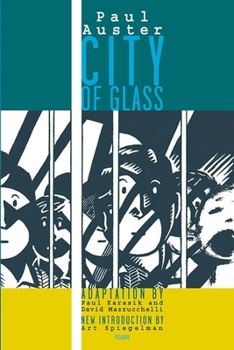City of Glass: The Graphic Novel
Select Format
Select Condition 
Book Overview
The highly acclaimed graphic novel adaptation of Paul Auster's classic City of Glass, featuring a new introduction by Art Spiegelman.
Quinn writes mysteries. The Washington Post has described him as a "post-existentialist private eye." An unknown voice on the telephone is now begging for his help, drawing him into a world and a mystery far stranger than any he ever created in print.
Format:Paperback
Language:English
ISBN:0312423608
ISBN13:9780312423605
Release Date:July 2000
Publisher:Picador USA
Length:144 Pages
Weight:0.49 lbs.
Dimensions:0.3" x 5.6" x 8.3"
Customer Reviews
1 rating
They Don't Make Them Better Than This!!!
Published by Thriftbooks.com User , 5 years ago
Here comes my ego in its magnitude- but more importantly a journal entry for myself to come across later: My selection in books these days has made it impossible to rate the ***** with those below and had already made me give up reviewing (more-so diagnosing critically) them completely or at all since it would take so much time that I could not justify it without being hired to do so.
I'll give this some credit but may stop reviewing for awhile. Maybe just dictate and forgot editing, ordering of thought or formatting.
This adaptation was so good that I could review the book it came from without reading it. Not ideally but well enough to make anyone want to read it. Definitely strong-arm some into its pages.
Original Book: BRILLIANT and beyond the reach of the mass of fiction in its scope. The careful reader will, by the way its written, become ALL characters which is the greatest compliment of writing that I have. While picking apart the inexperience of the new detective you gain appreciation of the writers' ability to write against reason for the bigger picture which swells proportionately until roller-coaster ride stops abruptly and you realize that he is writing a book within a book just as his characters had diagnosed within the story. The hardest thing for a sane writer to do well is to write incrementally blossoming insanity directly from the consequences of a characters' actions when that subject begin categorically sane. Even more-so when the insanity is borne from interaction with other characters. He writes the inner-workings of a characters' genius as well as any without straying from the sanity which resides within the individual's insanity. That also has to take into acount the fact that those catagorized as sane (not me by my personal definitions!) are intrinsicall insane living within our established parameters. The challenge, that Auster may have met flawlessly, is correctly detaching the character from his beginning parameters of sanity- directly building pressure on and extrapolating the mental soft-spots which are well-defined in their introduction. He loses his mind in appropriate pace which takes vigilance- any good writer can have an event unhinge a character to proper and compelling effect. Mastering the hard way needs to be applauded by the reader that takes nothing for granted.
Those last seven words are the reason I have to cut this off now. I want to go back and add more examples and infuse more depth into all which would cause the review/diagnosis of the original book to expand until I had to edit for the readers (your) sake. The same would happen below:
BACK TO THIS ADAPTATION:
You're not going to get a better introduction than Callahan's so read it and by keeping it in mind throughout you will enjoy the book and its depth even more. Specific knowledge of and/or good exposure to genre makes it brilliant and will bring the rest of you to the correct mindset and expectations forcing you, like a great teacher, to appreciate for its accomplishments within a sphere as icing on the delicious cake of the whole.
The written adaptation by Paul Karasik AND* David Mazzucchelli (always better every time that artist is a/the writer) gets the second and third highest compliments with the possibly of the Grand Prix:
3.) It makes made me feel like I read the whole book- specifically by making me have to think purposefully to decide where I was positive (incorrectly or not) that too much, importance-wise, was cut.
2.) Makes me feel that I got enough greatness out of the adaptation that I'll forego reading the original.
1.) I would bet significantly that the highest honor- being better than the original (pretending the art is stricken from the assessment)- is off-limits here IN WHICH CASE THIS DOES ACHIEVE THE PARAMOUNT PRIZE! In my experience, with great text-only books that are managed with appropriate economy from start to finish, the depth and details that are lost makes significant abridgements inferior.





